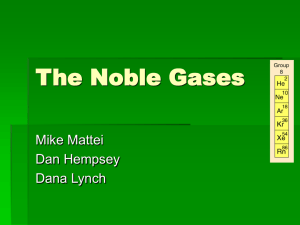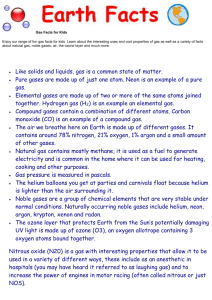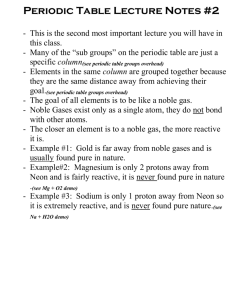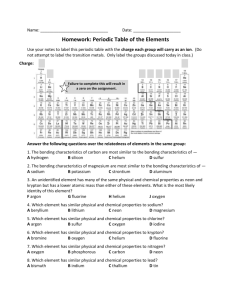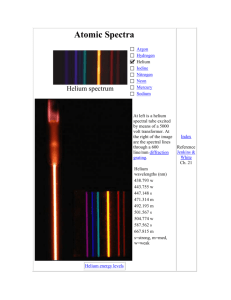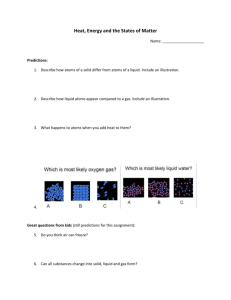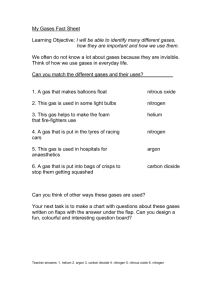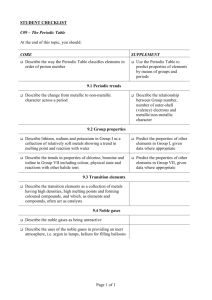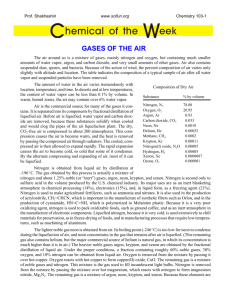Group 8A: Noble Gases - Shoreline School District
advertisement
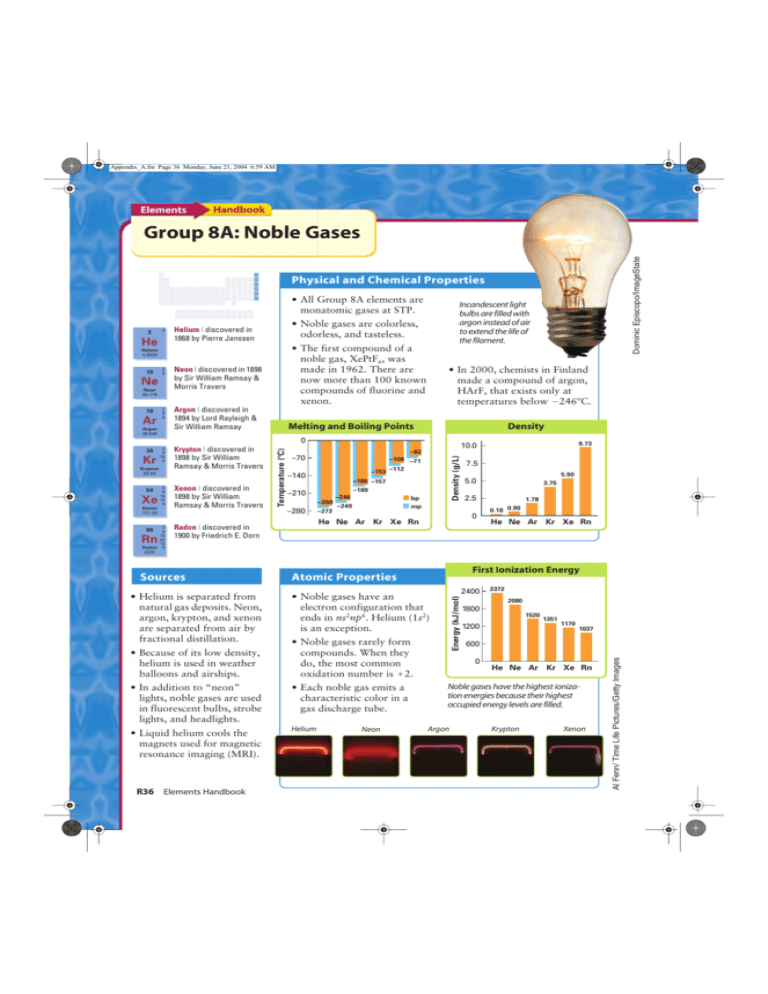
Appendix_A.fm Page 36 Monday, June 21, 2004 6:59 AM Elements Handbook Dominic Episcopo/ImageState Group 8A: Noble Gases Physical and Chemical Properties • All Group 8A elements are monatomic gases at STP. 2 2 He • Noble gases are colorless, odorless, and tasteless. Helium | discovered in 1868 by Pierre Janssen • The first compound of a noble gas, XePtF6, was made in 1962. There are now more than 100 known compounds of fluorine and xenon. Helium 4.0026 10 2 8 Neon | discovered in 1898 by Sir William Ramsay & Morris Travers 2 8 8 Argon | discovered in 1894 by Lord Rayleigh & Sir William Ramsay Ne Neon 20.179 18 Ar Argon 39.948 Incandescent light bulbs are filled with argon instead of air to extend the life of the filament. • In 2000, chemists in Finland made a compound of argon, HArF, that exists only at temperatures below 246ºC. Melting and Boiling Points Density Krypton 83.80 54 Xe 2 8 18 18 8 Xenon 131.30 2 86 8 18 32 18 Radon 8 Rn Krypton | discovered in 1898 by Sir William Ramsay & Morris Travers Xenon | discovered in 1898 by Sir William Ramsay & Morris Travers 9.73 10.0 –62 –70 –108 –71 –153 –112 –140 –186 –157 –189 –210 –246 –269 –280 Density (g/L) Kr 2 8 18 8 Temperature (C) 0 36 –272 bp mp –249 5.90 5.0 3.75 2.5 0 He Ne Ar Kr Xe Rn Radon | discovered in 1900 by Friedrich E. Dorn 7.5 1.78 0.18 0.90 He Ne Ar Kr Xe Rn (222) • Because of its low density, helium is used in weather balloons and airships. • Noble gases rarely form compounds. When they do, the most common oxidation number is 2. • In addition to “neon” lights, noble gases are used in fluorescent bulbs, strobe lights, and headlights. • Each noble gas emits a characteristic color in a gas discharge tube. • Liquid helium cools the magnets used for magnetic resonance imaging (MRI). Helium R36 Elements Handbook 2400 • Noble gases have an electron configuration that ends in ns2np6. Helium (1s2) is an exception. Neon 2372 2080 1800 1520 1200 1351 1170 1037 600 0 He Ne Ar Kr Xe Rn Noble gases have the highest ionization energies because their highest occupied energy levels are filled. Argon Krypton Xenon Al Fenn/ Time Life Pictures/Getty Images • Helium is separated from natural gas deposits. Neon, argon, krypton, and xenon are separated from air by fractional distillation. First Ionization Energy Atomic Properties Energy (kJ/mol) Sources Paul A. Souders/CORBIS Appendix_A.fm Page 37 Monday, June 21, 2004 6:59 AM Ne Neon Lights By 1855, scientists could produce light by passing an electric current through a gas under low pressure in a sealed glass tube. With the discovery of the noble gases, a new technology emerged. In 1910, George Claude displayed the first neon lamp in Paris, France. Xe Xenon-Ion Engines In 1923, a car dealer from Los Angeles bought two signs that spelled out “Packard” for $24,000 (about $250,000 in today’s dollars). When he displayed the signs in Los Angeles, people described the light as “liquid fire.” By the 1930s, businesses were using neon lights to draw the attention of customers. The signals for a television program may bounce off a communication satellite. The satellite is in orbit above the equator. The position of the satellite may be maintained by a xenon-ion propulsion system. Although all noble gases emit visible light when their atoms are excited, neon and argon are the gases most often used in neon lights. Orange-red lights contain only neon. Other colors are produced by adding a bit of mercury to the noble gas. The tube is coated with a material that glows when exposed to UV light emitted by mercury vapor. ■ When electrons strike xenon atoms in a xenon-ion engine, the atoms lose electrons and form positive ions. The ions are accelerated by a charged grid and shot from the engine at about 105 km/h. This action pushes, or thrusts, the satellite in the opposite direction. With multiple engines facing in different directions, a satellite can be moved in any direction. Ar Taken For a Ride By Argon Whether riding on a paved city street or on an unpaved mountain trail, a bicyclist is likely to find rough patches. When faced with rough terrain, the cyclist may worry about the tires, but probably not about the bicycle frame. The frame is made of steel or aluminum alloy tubes that are joined together. The tubes are joined together by Gas Tungsten Arc Welding (GTAW). An electric arc is struck between a tungsten electrode and the parts to be welded. Heat from the arc melts the ends of the tubes and fuses them together. Filler may be placed between the ends of the tubes to increase the strength of the joint or to produce a smoother joint. Tim McGuire/CORBIS During welding in air, there is a danger that the metal tubes or electrode will oxidize. To prevent oxidation, the area around the arc is filled with an inert gas, most often argon. Welding with argon has an added benefit. Because argon is a poor conductor of heat, the arc that forms is narrow. This narrow arc produces a weld that is both neat in appearance and mechanically strong. ■ Although a xenon-ion engine produces a relatively small amount of thrust, it can provide thrust for months or years. This makes xenon-ion engines a good choice for lengthy space missions. In addition, an inert gas poses no hazard for the satellite or the people who handle the propellant tanks. ■ ? Did You Know... When liquid helium is cooled to below 2 K, its viscosity drops to zero. It will escape from an unsealed container by flowing up the sides of the container. Group 8A: Noble Gases R37
